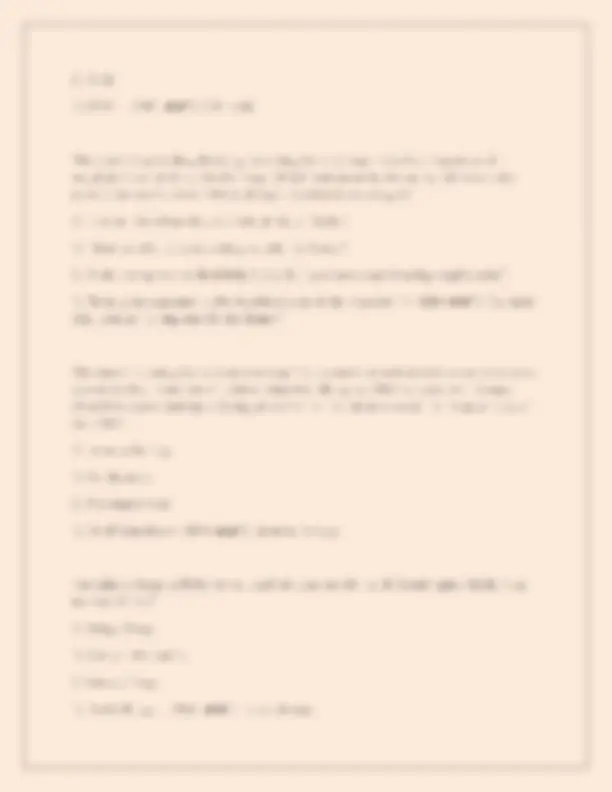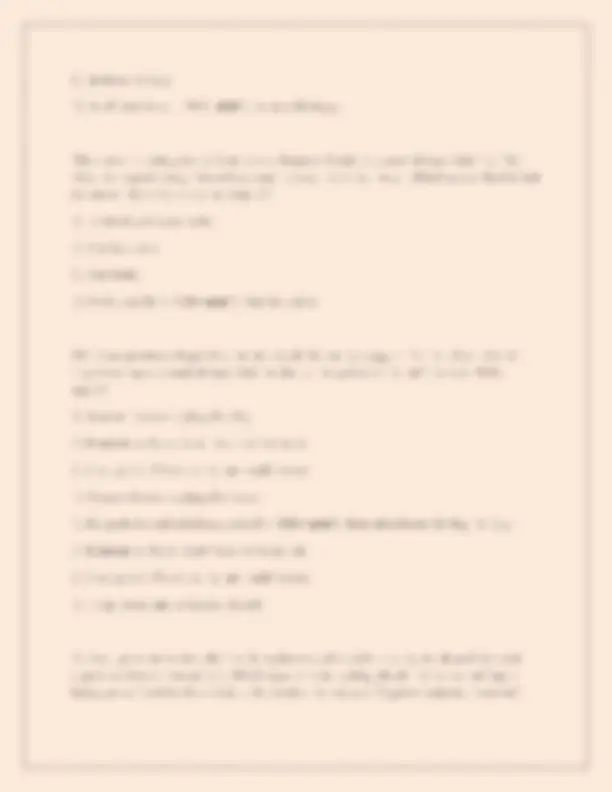Partial preview of the text
Download Hypersensitivity Reactions: Multiple Choice Questions and Answers and more Exams Nursing in PDF only on Docsity!
A client is noted to have a type | (IgE-mediated) hypersensitivity reaction with a systemic response. Which clinical manifestation should the nurse anticipate? (Select all that apply) \. Allergic rhinitis B. Stridor or . Wheezing 2. Urticaria mo . Hypotension — ANS-WWB. Stridor or . Wheezing 9. Urticaria I. Hypotension Which hypersensitivity reaction releases enzymes that increase tissuc damage? A. Type III B. Type IV C. Type I 1D. Type Il — ANS-vWv Type TI Which is the nurse's PRIORITY action when managing a client experiencing a type | hypersensitivity? A, Management of arthralgia B. Airway management C. Stopping the blood transfusion D. Deercasing a fever — ANS-VWWB. airway management How are the systemic type | Igk—mediated responses initiated? A. With contact of the allergen and Igl! in the conjunctival tissues. 1B. by contact of the allergen with Ig in the bronchial tree C. the allergen makes contact with the [gl- in the circulatory system D. Allergens are absorbed in the G] mucosa — ANS-¢WWD. Allergens are absorbed in the GI mucosa The nurse is providing leaching Jar a client on dietary intake and anaphylaxis. Which food should the nurse identify thal trigger anaphylaxis in a sensitized individual (Select all that apply) A. Vish B. Coconut oil C. Milk 1D. Chocolate I. Grains — ANS-WWD. Chacalate Ie. Grains The nurse is teaching a group of clients with allergics to foods and a history of asthma about the risk factors for the deyclopment of anaphylaxis. The nurse identifies which age group as having the highest risk for the development and severity of anaphylaxis? A, Adolescent B. Older adult A nurse is reviewing the chart of a newborn treated for hemolytic discase, Which statement shows the nurse's understanding of the cause of the discase? A. "Neutrophils attempt to phagacytize the RBCs." B. "antibodies bound with an antigen activate the cascade destroying the RBCs. C. "Complement activation causes the release of inflammatory chemical mediators resulting in RBC destruction," D, "Endogenous antigens stimulate a type II reaction resulting in lysis of the RBC." — ANS-W¥WB, "Antibodies bound with an antigen activate a cascade destroying the RBCs." to determine the causes of hypersensitivity reaction, a prick test may be used. Which statement is the most accurate to describe this procedure and results? (sclect all that apply) A, The client must avoid contact with the allergen for 48 hours alter the skin test. B. A positive response may include pruritus, erythema, and development of a wheal. C. The allergen is diluted anly if a severe s sstemic reaction is anticipated, D. A positive response can be determined within 15-20 minutes, E. The diluted allergen extract is intradermally injected in the forearm area. — ANS— Vv 13. A positive response may include pruritus, erythema, and development of a wheal, D. A positive response can be determined within 15-20 minutes A client is starting treatment for a hypersensitivity reaction, Which pharmacologic therapy should the nurse anticipate will be initiated to develop IgG antibodies to the allergen? A. Nonsteroidal anti-inflammatory medications LB. Corticosteroids C, Immunotherapy PD. Antihistamines — ANS-WWC. Immunotherapy The nurse is caring for a client newly diagnosed with scasonal allergic rhinitis. The client is experiencing rhinorrhea, water eyes, and itchy throat. Which prescribed initial treatment does the nurse anticipate? A, Inhaled corticosteroids B. Antihistamine C. Antibiotic 1D. Oral steroids - ANS-WWB. Antihistamine Which nonpharmacologic treatments should the nurse suggest for the client who is experiencing scasonal allergic rhinitis due to the pollen in the air? (seleet all that apply) A. Remain indoors during the day 1. Maintain a clean, dust—free environment C. Use special filters on the air conditioners 1D. Shower belore exiling the house E. Keep doors and windows closed - ANS-WWA,. Remain indoors during the day B. Maintain a clean, dust—lree environment C. Use special filters on the air conditioners DD. Keep doors and windows closed \ client presents lo the clinic with erythema and vesicles on the trunk and bilateral upper and lower extremities. Which type of skin testing should the nurse anticipate being prescribed for the client to determine the cause of hypersensitivity reaction? I. Administer oxygen via nasal cannula at the prescribed rate When planning care for a client admitted with a hypersensitivity reaction, the nurse addresses the potential problem of airway clearance. Which intervention will assistaniships in addressing this potential problem? (Select all that apply) A. Assessing level of consciousness B. Administering oxygen C. Auscultating lung sounds D. Placing the client in a supine position e, Administering epinephrine — ANS-WWA, Assessing level of consciousness 3. administering oxygen C, Auscultating lung sounds [. Administering epinephrine When planning care for a client admitted with a hypersensitivity reaction, the nurse addresses the potential problem of impaired tissue perfusion, Which intervention will assist in addressing this potential problem? \. Manitoring urine output B. Prayiding calm reassurance C. Assessing for pain ». Elevating the head of the bed - ANS-WWA, monitoring urine output The nurse is caring for a client with a history of anaphylaxis related to a known latex allergy. Which is a priority goal when planning a nursing intervention for the client? A, the client will avoid the known allergen B. The client will teach family members about the life-threatening candition C. The client will verbalize an understanding of the goal D. The client will avoid the foods linked to the latex allergy, - ANS-WWA, the client will avoid the known allergen 















